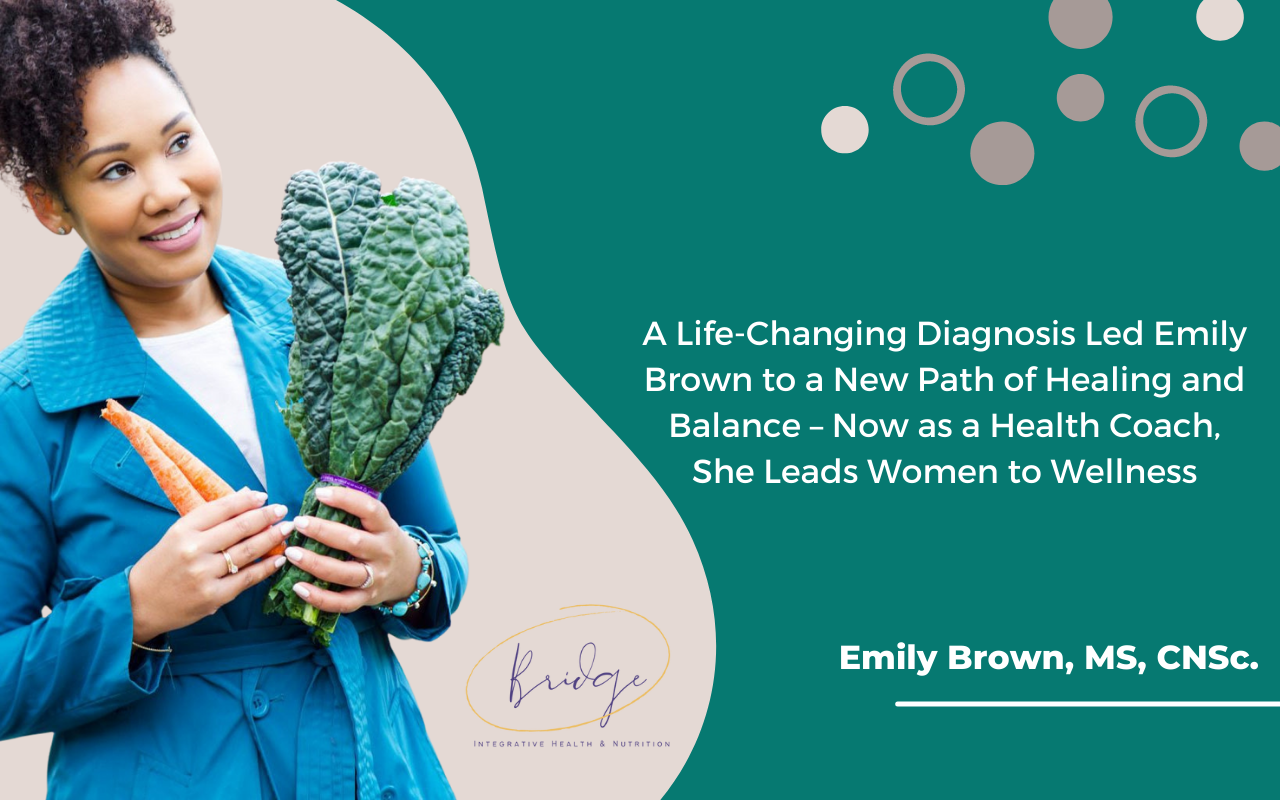Working on Capitol Hill as a business journalist validated Emily Brown’s passion for writing, but it also made her life more stressful than meaningful. A decade of a demanding job was more than her body could take, and the physical traumas led her down a path of healing, discovering passions she didn’t expect. She wondered what else she could do, and a career change finally gave her an answer to what was her next chapter. Emily now gleans a different kind of joy coaching her clients as a nutrition educator and wellness coach.
A Life-Changing Diagnosis
Living in modern America, women specifically are apt to prioritize busyness and accept stress as the consequence of life. However, the more stress builds up over time, the more susceptible the body becomes to chronic inflammation. According to a 2018 study, people with stress-related disorders are more likely to develop autoimmune conditions. Based on her own story, this is most likely true for Emily and the hardworking women she coaches. She explains, “Women are more likely to be diagnosed with autoimmune diseases compared with men because women tend to do so much for their family and other people at work and in their community.” However, many women are hesitant to get diagnosed because we tend to want to handle the challenge on our own.
Emily struggled advocating for herself, too. While still working as a journalist, she became a new mom much sooner than expected due to preeclampsia, a disorder caused by issues with the immune system and insufficient blood flow to the uterus. However, she continued to experience debilitating symptoms for months afterward – sleeping most of the day, weight gain, and hair loss – until a family friend recommended that she see an endocrinologist, a doctor who treats hormone-related diseases. The symptoms she was experiencing were due to Hashimoto’s, an autoimmune condition when the thyroid gland can’t produce enough hormones because of inflammation. Finally, she got a diagnosis to make her feel empowered and a prescription to get back to a sense of normalcy.
Yet, Emily still couldn’t shake the overwhelming emotions and lies plaguing her. “I was in my twenties and a new mom; I was not expecting to deal with a long-term condition. I felt it was unfair to deal with that. I asked myself: What did I do to deserve that? What position did I put myself in to get an autoimmune condition?” Looking back now, she knows not managing her stress led to the worsening of this autoimmune condition. So, she wanted to take steps to have better management of her symptoms because she didn’t feel content with solely relying on her medication. Tapping into her investigative skills, Emily took to the internet to find supplemental relief. She kept coming across the assurances of elimination diets alleviating symptoms of Hashimoto’s and gave it a try. Through giving up gluten, she experienced not only the relief she was looking for, but a more balanced mental state. Combining intuitive eating and adopting the Health at Every Size (HAES) approach “lit a fire” in Emily. She now believes in “being your own advocate for your health and not relying exclusively on what others say. If your instinct is telling you something, listen to it.” Emily was hooked on holistic wellness and never looked back.
After being gluten free for four years, Emily started noticing a discoloration of her skin in spots on her hands and feet. It was a slow progression as she continued to manage her stress and lifestyle choices, but she was eventually diagnosed with vitiligo, her second autoimmune condition, less than three years later. For about 25% of people with autoimmune conditions, it is not uncommon for additional ones to develop. Because there are no effective treatments for vitiligo, accepting her skin as it is and managing her stress will help slow the progression.
Teaching Others to Be Their Own Advocate
Emily didn’t want to feel limited by her autoimmune condition and wanted to set an example for her young children. So, it was essential for her to manage her environment with a remote job. With her family’s support and inspiration, she thought about her new passion for a more holistic wellness approach when managing autoimmune diseases. In 2019, she became certified in health and wellness and mental health with identifying interventions before starting her own health and wellness coaching business. Then in 2022, she earned her master’s in human nutrition and functional medicine to better help her clients.
It was a natural choice for her to focus on helping women redefine what their lives should look like after an autoimmune diagnosis. When diagnosed with an autoimmune condition, women don’t feel useful anymore because of new limitations from symptoms. She validates women by being their “voice of reason” when they are creating a life right for them. She wants to focus on their unique healing journey, because it won’t be the same as hers. “Everyone has their own blueprint of what they need. Coaching allows me to focus on each person’s health and wellness. I have to allow them to evolve in their own way because nobody’s path is the same.” She challenges her clients in this way by asking: “What will your life look like?” This question hinges on the belief, “You can decide for yourself what your life will be like. You need to strip things away and figure out what is right for you in whatever season you are in at the moment.” This very idea opposes our social media-focused culture, but it’s important to Emily to reverse the damage. Managing both a dermatological and thyroid condition, Emily has to redefine her definition of societal beauty standards for herself and her clients. She desires to see a more diverse representation of disabilities and skin conditions in the media because it inspires her and gives her hope when she has her own seasons of discouragement and knows it will do the same for people who struggle with long-term conditions.
Tools for Health and Wellness Balance
Faith and Spirituality
Emily implements tools of self-care and wellness approaches for herself and her clients to help with this reversal. Her first line of defense is her faith. When viewing life at a spiritual level, she has the confidence in the knowledge she is created for a purpose, and everything has a reason. She expounds on this idea by explaining, “Society has developed and redefined what beauty is. It is a spiritual discipline to focus on the internal instead.” Inflammation is a commonly occurring symptom in autoimmune conditions, which makes the body feel out of balance.
For this reason, it is easy to turn to external factors to have a sense of control, whether that is through eating patterns, exercise, or another destructive habit. Emily says, “When your body is in a state of chaos you are looking for a solution and grasping at anything you can.” Women want to gain peace in and outside of their bodies and the best way to do that is to get back in touch with what the body instinctively wants regarding food and movement choices.
Intuitive Eating
Not obsessing over having control of the external is also practiced through the Intuitive Eating model. This is a gentle nutrition approach needed for people who have experienced damage to their bodies through restrictive diets and/or symptoms of autoimmune conditions. When following the ten principles to change patterns of destructive eating, healing is gained at not only a cellular level, but emotionally and mentally.
Health at Every Size
The HAES approach, a movement for social justice in medical care, also allows people to become tuned in with their present body shape and size without judgment. When managing a long-term condition, you tend to have toxic thoughts around how your body looked and functioned in the past and how you want it to be in the future. Instead, it is more helpful to acknowledge and accept what state your body is in right now. Health fluctuates over time and can no longer have rigid expectations, especially when faced with disease, physical and mental illness, or limitations. Honoring and respecting your body where it is now will give you better opportunities in finding health and well-being. Emily advocates taking out the stress of labeling your body and your food as good or bad, as it calms the nervous system and puts you into a better state of mind to manage an autoimmune condition.
Emily has matured and learned more about herself through her diagnoses, finding compassion and grace in the difficult times. She implores her clients to have the same compassion and grace with themselves during discouraging moments. When implementing resources to create your own health and wellness blueprint, having an autoimmune condition changes from being something you have to control into a freeing lifelong journey.
Join Emily as she shares “5 Tips to Show Your Kidneys Some Love” on Friday, March 11 at 11:30 am CST. In honor of National Kidney Month, this educational session will be Live in Her Nexx Chapter Community. We invite you to join our free Community to attend this event as well as many others.
- A Divine Calling Helps the Deaf Community: An Interview with the Dedicated Leaders of Sign1News - September 29, 2024
- Castor Oil Packs: Do They Live Up to the Hype? - February 6, 2024
- Making a Global Impact with Your Morning Coffee - November 29, 2023
Follow us:







